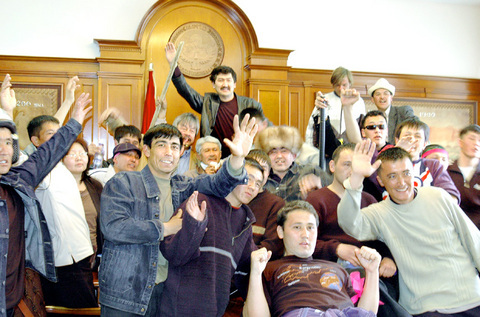Protesters stormed the presidential compound in Kyrgyzstan on Thursday, seizing control of the main symbol of state power after clashing with riot police surrounding it during a large opposition rally.
About 1,000 protesters managed to clear riot police from their positions outside the fence protecting the building, and about half entered through the front. Others smashed windows with stones, while hundreds of police watched from outside the fence, where thousands more protesters remained. Neither side visibly carried any firearms.
The whereabouts of beleaguered President Askar Akayev were not clear, amid reports that he had left the presidential office and arrived at a Russian airbase outside Bishkek. Kurmanbek Bakiyev, one of two main opposition leaders, was with the protesters at the government building.

PHOTO: AFP
Protesters led the defense minister out of the building, holding him by the elbows and trying to protect him, but others threw stones at the military chief and one protester kicked him. Interior Ministry troops led other officials out, and three injured people, bandages covering their wounds, left accompanied by a doctor.
The tumultuous scene was the culmination of the first major rally in the Kyrgyz capital since opposition supporters seized control of key cities and towns in the south this week to press demands that the long-serving Akayev step down amid widespread allegations of fraud in this year's parliamentary vote.
"I am very happy because for 15 years we've been seeing the same ugly face that has been shamelessly smiling at us," said 35-year-old Abdikasim Kamalov, standing outside the building with legs planted apart, holding a red Kyrgyz flag. "We could no longer tolerate this. We want changes."
Kyrgyzstan lacks the rich energy resources or pipeline routes that have made of some of its Central Asian neighbors the focus of struggles by Russia, the US and China for regional influence. But the former Soviet republic's role as a conduit for drugs and a potential hotbed of Islamic extremism, particularly in the impoverished south, makes it volatile.
Both the US and Russia -- which is part of a six-nation military pact with Kyrgyzstan -- maintain military bases near Bishkek, and Moscow said yesterday it had increased security at its facility.
Akayev's whereabouts were not clear. He was to meet later Thursday with an envoy from the Organization for Security and Cooperation in Europe, which had made overtures to help mediate the crisis.
Many of the demonstrators came from a rally on the outskirts of Bishkek, where protesters roared and clapped when an opposition activist asserted Akayev's foes would soon control the entire country.
"The people of Kyrgyzstan will not let anybody torment them," Bakiyev, who heads the People's Movement, told the crowd at the earlier rally. "We must show persistence and strength, and we will win."

ACTION PLAN: Taiwan would expand procurement from the US and encourage more companies to invest in the US to deepen bilateral cooperation, Lai said The government would not impose reciprocal tariffs in retaliation against US levies, President William Lai (賴清德) said yesterday, as he announced five strategies to address the issue, including pledging to increase Taiwanese companies’ investments in the US. Lai has in the past few days met with administrative and national security officials, as well as representatives from various industries, to explore countermeasures after US President Donald Trump on Wednesday last week announced a 32 percent duty on Taiwanese imports. In a video released yesterday evening, Lai said that Taiwan would not retaliate against the US with higher tariffs and Taiwanese companies’ commitments to

Intelligence agents have recorded 510,000 instances of “controversial information” being spread online by the Chinese Communist Party (CCP) so far this year, the National Security Bureau (NSB) said in a report yesterday, as it warned of artificial intelligence (AI) being employed to generate destabilizing misinformation. The bureau submitted a written report to the Legislative Yuan in preparation for National Security Bureau Director-General Tsai Ming-yen’s (蔡明彥) appearance before the Foreign Affairs and National Defense Committee today. The CCP has been using cognitive warfare to divide Taiwanese society by commenting on controversial issues such as Taiwan Semiconductor Manufacturing Co’s (TSMC, 台積電) investments in the

‘SPECIAL CHANNEL’: Taipei’s most important tasks are to stabilize industries affected by Trump’s trade tariffs and keep negotiations with Washington open, a source said National Security Council Secretary-General Joseph Wu (吳釗燮) arrived in the US for talks with US President Donald Trump’s administration, a source familiar with the matter said on Friday. Wu was leading a delegation for a meeting known as the “special channel,” the Financial Times reported earlier. It marked Trump’s first use of the channel since returning to the White House on Jan. 20. Citing a source familiar with the matter, the Financial Times reported that Minister of Foreign Affairs Lin Chia-lung (林佳龍) was also a part of the delegation. The visit came days after China concluded war games around Taiwan and amid Trump’s

HELPING HAND: The steering committee of the National Stabilization Fund is expected to hold a meeting to discuss how and when to utilize the fund to help buffer the sell-off The TAIEX plunged 2,065.87 points, or 9.7 percent, to close at 19,232.35 yesterday, the highest single-day percentage loss on record, as investors braced for US President Donald Trump’s tariffs after an extended holiday weekend. Amid the pessimistic atmosphere, 945 listed companies led by large-cap stocks — including Taiwan Semiconductor Manufacturing Co (TSMC, 台積電), Hon Hai Precision Industry Co (鴻海精密) and Largan Precision Co (大立光) — fell by the daily maximum of 10 percent at the close, Taiwan Stock Exchange data showed. The number of listed companies ending limit-down set a new record, the exchange said. The TAIEX plunged by daily maxiumu in just